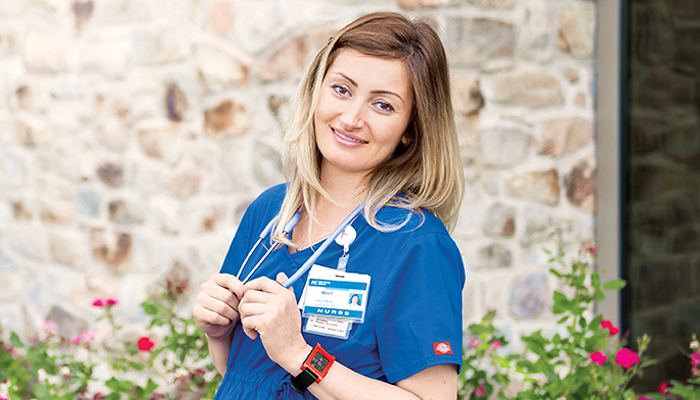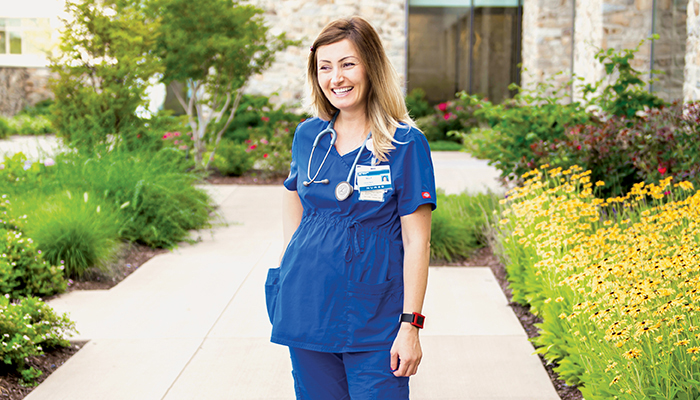Latitude Adjustment: Alumna Has Healthy Outlook on Her New Life in America

Nilufer Mutlu and her family were among the more than 300,000 ethnic Turks driven out of Bulgaria in 1989. After Communism ended in Europe, she returned to Bulgaria but was unable to realize her dream of becoming a nurse.
She brought one suitcase with her from Bulgaria. After the 12-hour flight from Istanbul via Amsterdam, she was nervous and excited to start her new life. Beside her was her fiancé, Behrang, an American she had met in Istanbul two years earlier. She did not speak any English, though she knew Russian, Bulgarian, Turkish, and French. Upon arrival in Houston, the couple was separated; she had to go through a detailed customs and immigration interview.
“By the time they escorted me to the luggage area two hours later,” she says, “I saw my fiancé and the only suitcase remaining there was mine. It was opened and broken, but nothing was missing. I probably filled it too much.”
Nilufer Mutlu ’14’s almond-shaped eyes suggest Persian ancestry. A Slavic accent hints at her Eastern European origins. Her petite frame and calm demeanor conceal a deep-seated resiliency and determination. She says she likes change and is adventurous by nature. When making the decision to leave home—neighborhoods, traditions, and family—the decision was easy: “We weren’t treated very well any place we lived,” she says.
When Nilufer was 10, the Communist government in Bulgaria banned the Turkish language—her native tongue—and forced all ethnic Turks to choose new Slavic names. The efforts were aimed at assimilating the minority Muslim population, which comprised a tenth of the population, and who had lived peacefully inside Bulgaria for 500 years, dating back to the Ottoman Empire.
Nilufer remembers when police first came to their door. They told the family they had 24 hours to rename themselves. She was in third grade.
“I went to school the next day, and the teacher said, ‘Now introduce yourself to the class in your Bulgarian name. You can no longer use the Turkish name or speak Turkish.”
Nilufer became Natalia.
Still, government pressure mounted against them, due in part to organized protests against their forced renaming. In 1989, more than 300,000 people were driven out of the country completely. Nilufer’s family was among them.
“My family and I, and many other Turkish families, were given 24 hours to leave Bulgaria. We left with one car, five family members, and three pieces of luggage. At that time, I was 13 years old.”
Her father left his auto repair shop; her mother, a nurse, hoped to find work in Istanbul. Natalia and her two sisters started school not speaking any Turkish. Though they did see friends from Bulgaria, others who were displaced, they were outsiders—and treated as such.
“I could not wait to graduate from high school and go back to Bulgaria,” she says. “Many of my friends were going back to study there. The lifestyle was more fun, and it was the culture that we were familiar with. The culture in Turkey was very different, suppressed, negative. I felt like I did not have any freedom there.”
Things changed after the Berlin Wall fell on November 9, 1989. Bulgaria followed suit by ousting its longtime communist dictator. By 1990, the new ruling party in Bulgaria restored cultural rights to ethnic Turks and welcomed them back.
The family split for practical purposes: her grandparents and father returned to reclaim the family’s property, while her mother remained behind in Turkey, where wages were better, with Nilufer and her two sisters. After graduation from Dr. Kemal Naci Eksi High School, Nilufer enrolled in nursing school in Varna, Bulgaria.
“I loved the nursing program, but tuition was very expensive.” Because she was considered a Turkish citizen, a foreigner, she paid a higher rate. After struggling to pay, she had to withdraw from school—just before graduation.
Disappointed and angry, she returned to Istanbul where her older sister, Nilgun, a doctor, helped her land a medical assistant job at Düzen Laboratuvari, a prestigious private laboratory. That was the last job she worked before coming to America.
“I knew one day I would finish nursing school,” she says. “I did not know it would be here in America, in English. Now I know that God had a better and bigger plan for me, and everything happened for a good reason.”
From Turkey to Takoma Park
Five days after landing in Houston, Nilufer and Behrang moved to Maryland. He had completed a PhD in physics at Rice University and was going to start a new job as a researcher for NIST, the National Institute of Standards and Technology in Gaithersburg. Along the 1,400-mile road trip, Nilufer saw the country through the lens of a hopeful immigrant. The large food portions surprised her, and she found the people friendly, places clean, and society organized.
“When we arrived in Maryland, I felt at home right away,” says Nilufer. “The weather was similar to Bulgaria, and it was as green as my city of Shumen.”
One of her first priorities was to learn English. She enrolled in the English as a Second Language program at Montgomery College, and spent the next three years memorizing vocabulary, practicing sentence construction, and working on prerequisite courses for the College’s nursing program.
“I worked hard. I had to rewrite essays four and five times to get them right,” she says. “I recorded class lectures and listened to them in my car on my commute to school, instead of listening to music. And even that wasn’t enough. I looked for a job, so I could learn how Americans talk and joke.”
While tackling English, biology, anatomy, and physiology, she landed a job at the MC Bookstore as a sales clerk. She later worked retail at a shopping mall, where she also learned what scented candles and body products Americans like to buy. When she was admitted to the College’s nursing program, she was finally able to pursue her goal of becoming a nurse.
Patsy O’Meara, who manages the nursing lab, noted Nilufer’s diligence. O’Meara, a 10-year College employee, transitioned to teaching from a career in nursing at Washington Hospital Center, then in management at Georgetown University Hospital.
“Working in the lab, I get to meet all the nursing students,” says O’Meara. “The goal is to admit 128 students each semester. Each of them is required to come in to practice hands-on skills. Nilufer was a stand-out student. She is someone who wants to make sure the right thing happens. And she is very diplomatic in her exchanges. In health care, that is very important.”
From Nilufer to Nelly
Today, Nilufer is known to her American friends and colleagues as Nelly. She has a bachelor’s degree in nursing (BSN) from Frostburg University (2016), and is currently working on a master’s degree in nursing education. At Holy Cross Hospital Germantown, where she has worked since it opened in October 2014, she often encounters nursing students.
“The nursing program at MC is excellent. It prepared me to do the hands-on work of nursing as well as the academics. And in the clinical groups I see [at the hospital], the MC students are the most confident and independent. They know their stuff because MC’s nursing lab is really good—and the professors are available to their students.”
MC students have hundreds of opportunities to practice nursing skills, such as administering medication and injections, monitoring cardiac rhythm, and inserting catheters, long before they work with patients. Skills lab practice is a required part of each nursing course, and the labs are equipped with lifelike mannequins of adults and children, as well as supplies and equipment identical to what is used in hospitals.
In addition, nursing faculty have incorporated simulation into the curriculum, enabling students to learn how to manage everything from patient health assessments and patient education to code blue and end-of-life situations.
For clinical rotations, a significant component of the program, nursing students work in area hospitals, nursing homes, and other health agencies.
“Our clinical model allows for eight students to have experience at the hospital with a single MC nursing instructor,” says O’Meara. “This ratio allows instructors to promote learning and safety.”

Today, Nilufer Mutlu works as an RN at the Holy Cross Germantown Hospital on the Germantown Campus. She has a BSN and will complete a master’s degree in nursing education. She spent her first three years at MC taking English as Second Language courses and nursing program prerequisites.
Fitting In and Moving Forward
After a decade in the United States, Nelly has visited 22 states, but has never gone back to Bulgaria. The Old Country still conjures memories of being mistreated, but she welcomes family members when they visit. “I do not want to remember the struggles of the past. I want to enjoy now, and the future.”
If she were to map the places she considers important in her life, she would pin the MC classroom where she took her first English classes; the MC Bookstore, her first job in America; and the hospital on the Germantown Campus where she currently works: “These places will always be important to me.”
In her future, she envisions moving into teaching at MC, and passing on what she has learned to the next generation of nursing students. Many of those students will be non-native or new Americans, whose first language is not English and who may have similar experiences with being displaced, rejected, or lost for a time in their lives. She hopes to stand in the classroom as proof to them that they can begin again, and they can do well.
“My husband asked me recently, ‘what does America mean to you?’ and I told him: prosperity. I have worked hard for everything, and I am proud of my accomplishments.”
—Diane Bosser
Photography by Pete Vidal



I met her last summer, exactly on my birthday. She is so wonderful, and inspiring, because of her my goal change to BSN to get that master degree in Nursing too. Even it is a long road to reach I will do my best to have that Master degree, I am hoping to get in the Nursing program this coming Spring 2019. I hope this 2018 will be a smooth year for me. All the stuff in the Nursing program are nice and helpful, I cannot wait to see them again and work with them.